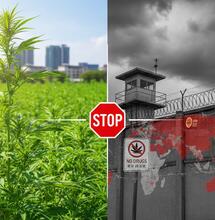Marijuana Popularity in Japan Challenges Strict Law

The rate of marijuana use in Japan is spiraling up, in particular among younger individuals. In a country known for its discipline and strict adherence to rules, some people like to call this phenomenon a ‘quiet revolution.’ The interest in marijuana undermines the effectiveness of current legislation and prompts researchers to analyze the reasons behind the trend. Why are young Japanese increasingly turning to cannabis, ignoring the risk of severe penalties that include prison?
The Strictest Anti-Drug Law in the World
Japan has some of the most stringent cannabis laws. The Cannabis Control Act of 1948, introduced during the American occupation, penalizes possession of marijuana, even in small amounts, with up to 7 years in prison. These regulations have created a strong social taboo, with marijuana being perceived as a dangerous drug for decades. However, social reality has diverged significantly from this image in recent years.
The Influence of Western Culture on Young Japanese
Younger people in Japan, influenced by Westernization through films, music, and social media, are beginning to see marijuana in a different light. For many, it is no longer a dangerous drug. Rather it’s a less harmful alternative to alcohol, which is associated with serious social problems in Japan. The normalization of cannabis in the West is contributing to a change in attitudes, creating a gap between the law and reality.
The Smoker’s Story Project
Dr. Yuji Masataka, an authority on cannabinoids and a member of the Japanese Clinical Cannabinoid Association (JCAC), conducted research published in the journal Drug Science, Policy and Law. As part of the Smoker’s Story Project, inspired by Paul Auster’s National Story Project, interviews were collected from 64 people (39 men and 25 women) over the age of 20 who shared their personal experiences with marijuana.
“We decided to collect and share individual stories on a public website,” explains Masataka. “While each story was personal and unique, we believed that collecting them would provide a broader picture of marijuana consumption in Japan.”
The researchers initially feared that people would be reluctant to talk about something that is enveloped by such a deep stigma in Japan. “To our surprise, more people came forward than we expected,” Masataka comments. “We believe this is largely due to the trust we have built in the community through our ongoing public education work under Green Zone Japan since 2017.”
Why Do Japanese People Use Marijuana?
The participants in the study project most often learned about marijuana from acquaintances or friends, and their main motivation was curiosity. While first-triers were anxious in the beginning, they quickly found out that the risks of smoking pot are low. Many considered it less harmful than tobacco or alcohol. First encounters with cannabis often took place during difficult times in life, such as being victim of abuse or violence, going through relationships problems, or stressful times at work.
Marijuana was used for various reasons: for its pleasant high-inducing effect, relaxation, enhancing mental and physical health, and as a form of self-medication. Like in other research, respondents reported relief from anxiety, stress, depression, pain, and appetite stimulation. Some replaced prescription drugs or alcohol with marijuana, which is significant in the context of the growing problem of non-prescription drug abuse in Japan.
“Cannabis users in Japan are often reduced to stereotypes, but their actual reasons for using are complex, personal, and deeply human,” Masataka says. “Our research gives them a voice and shows why people continue to use cannabis despite such strict regulations.”
Side Effects and Debunking the ‘Gateway Drug’ Myth
The respondents reported minor side effects, such as the usual dry mouth or fatigue. The study categorically rejected the “gateway drug” hypothesis, according to which marijuana leads to the use of stronger substances. For participants, the biggest problem associated with cannabis was its illegality, which concerns stress where to find it, and potentially ending on the wrong side of the law. There has been a record number of arrests in the past few years of mostly younger people, due to marijuana use. Around 70% of all arrests involve individuals below the age of thirty.
Determining if cannabis is a gateway drug has been also a subject of another recent study in Japan. A government-backed survey with 3,900 respondents who reported a lifetime of cannabis use, looked at the patterns of drug use in the country. It established that there is no link between marijuana consumption and continuing to use other substances. The study concluded that cannabis use in Japan usually occurs following alcohol or tobacco use, and people rarely reach out for anything else after that.
Marijuana in the Face of a Mental Health Crisis
Japan is grappling with an unprecedented mental health crisis, recording one of the highest suicide rates in the world, which is 17.43 deaths per 100,000 people. Both Japanese and international studies suggest that marijuana may support mental health by alleviating symptoms of stress and depression. In addition, cannabis may offer an alternative to addictive opioids, which are yet another social problem in Japan.
Cannabis for medicinal use is allowed in limited capacity in Japan as of 2023. The recent studies highlight the need to widen the legal channels within the Japanese healthcare system. Such changes could improve patient-centered care and contribute to the development of more effective, evidence-based health services.
A Quiet Revolution and the Need for Education
The so-called ‘quiet revolution’ of marijuana in Japan is not only a challenge to the law, but also a sign that societal awareness is changing. Through proper education of the medical and scientific communities, society can be protected from the real dangers posed not only by drugs, but also by ignorance. An open approach to marijuana, based on scientific evidence and personal stories, can contribute to the creation of a more informed and healthy drug policy.
More cannabis news from Soft Secrets:










